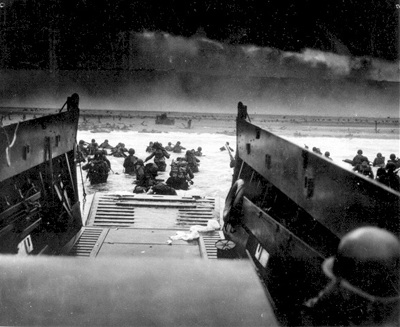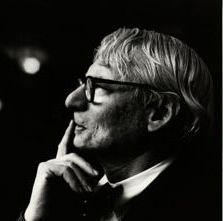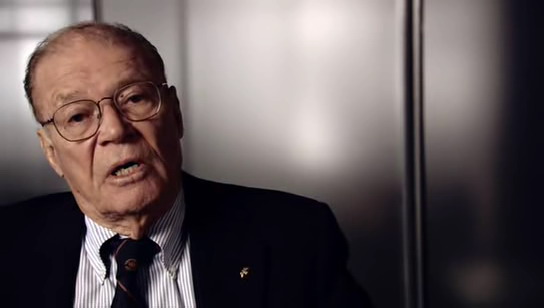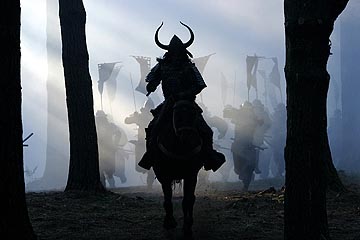“Never in the two and a quarter centuries of our history has the United States been so isolated among the nations, so broadly feared and distrusted.” A bipartisan group of 26 diplomats and military men call out Dubya Diplomacy for causing irreparable harm to the republic, and the statement is heady stuff. “The Bush Administration has shown that it does not grasp these circumstances of the new era, and is not able to rise to the responsibilities of world leadership in either style or substance. It is time for a change.“
Category: Asia
June 6, 1944.

“People of Western Europe: A landing was made this morning on the coast of France by troops of the Allied Expeditionary Force. This landing is part of the concerted United Nations’ plan for the liberation of Europe, made in conjunction with our great Russian allies …I call upon all who love freedom to stand with us.” – Dwight Eisenhower
The Wrath of Kahn.
 So, with the first slew of summer tentpole movies still over a week away (and, aside from Troy and possibly Spidey 2 and Azkhaban, it looks like a remarkably poor crop this year…Exhibit A: Van Helsing), I went over to check out My Architect: A Sons’ Journey at the Lincoln Cinemas last night. The documentary follows writer-director Nathaniel Kahn’s attempt to understand and come to terms with the life and work of his deceased prodigal father, Louis Kahn, who, besides being one of the more renowned architects of the postwar period, also kept up three different families and died anonymously and deeply in debt in a Penn Station bathroom in 1974. Mostly haunting, occasionally saccharine, My Architect succeeds inasmuch as it explores the mysteries of the father, but fails whenever it wallows in the emotional insecurities of the son.
So, with the first slew of summer tentpole movies still over a week away (and, aside from Troy and possibly Spidey 2 and Azkhaban, it looks like a remarkably poor crop this year…Exhibit A: Van Helsing), I went over to check out My Architect: A Sons’ Journey at the Lincoln Cinemas last night. The documentary follows writer-director Nathaniel Kahn’s attempt to understand and come to terms with the life and work of his deceased prodigal father, Louis Kahn, who, besides being one of the more renowned architects of the postwar period, also kept up three different families and died anonymously and deeply in debt in a Penn Station bathroom in 1974. Mostly haunting, occasionally saccharine, My Architect succeeds inasmuch as it explores the mysteries of the father, but fails whenever it wallows in the emotional insecurities of the son.
The advertising copy for My Architect quotes a New York Magazine review deeming it a “Citizen Kane-like meditation,” and at its best moments the film does suggest comparison with that 1941 classic. Inveterate romantic, spiritual nomad, ill-tempered workaholic, and a scarred and often-anxious thinker obsessed with issues of permanence and legacy, Louis I. Kahn is a man of many, many layers, and much of the resonance of My Architect comes from seeing his friends, admirers, lovers, and enemies grapple with their still-powerful memories of him, twenty-five years after his death. The film might have benefited from a more dispassionate analysis of Kahn’s work — certainly not all of his buildings are masterpieces (the film does say as much about a U-Penn medical complex), and I thought his plans for redesigning downtown Philadelphia were particularly ill-conceived. (I’m all for reducing automobile traffic in urban areas, but it seems strange and off-kilter to commemorate the cradle of the republic with the type of primitivist ziggurat Kahn seemed to specialize in.) Still, one can hardly fault Kahn for erring on the side of eulogy when remembering his father in film.
 What one can fault Kahn for, however, is the amount of time spent in My Architect on his own personal Oprah-esque mission of emotional acceptance. Particularly in the second hour, the movie takes long detours away from the architect’s portfolio to examine Nate’s relationship with his half-sisters or his cloudy memories of his dad’s hands. And, while I’m sure this is all very important to Nate Kahn, it’s frankly not very interesting to the viewer. In fact, I thought after a while that Kahn’s persistent presence — perhaps even mooning — in every interview or location detracted from our understanding and appreciation of his subject. For example, it’s hard to contemplate how Louis Kahn’s failure to build a synagogue in Jerusalem may have impacted the man when we have to sit through Nate cutely dropping his yarmulke over and over again.
What one can fault Kahn for, however, is the amount of time spent in My Architect on his own personal Oprah-esque mission of emotional acceptance. Particularly in the second hour, the movie takes long detours away from the architect’s portfolio to examine Nate’s relationship with his half-sisters or his cloudy memories of his dad’s hands. And, while I’m sure this is all very important to Nate Kahn, it’s frankly not very interesting to the viewer. In fact, I thought after a while that Kahn’s persistent presence — perhaps even mooning — in every interview or location detracted from our understanding and appreciation of his subject. For example, it’s hard to contemplate how Louis Kahn’s failure to build a synagogue in Jerusalem may have impacted the man when we have to sit through Nate cutely dropping his yarmulke over and over again.
Still, to be fair, this gripe, while a significant one, doesn’t kill the movie by any means. If it comes to your town, My Architect is well worth seeing as a study of one man’s struggle to achieve some kind of permanence during and despite a transient life, and how memories, like buildings, can both last forever and fall into disrepair.
Fire in the Hole.
Slate‘s David Greenberg (a Columbia PhD recently hired at Rutgers…congrats) examines the use and misuse of Iraq-Vietnam analogies.
No Tenure for You.
Sean Wilentz reviews trained historian Condoleeza Rice’s sense of her field in light of her recent testimony, and finds her wanting. Notes Wilentz, “The American Historical Review’s notice of her first book, a study of Russia and the Czech army after 1948, charged that Rice ‘frequently does not sift facts from propaganda and valid information from disinformation or misinformation’ and that she ‘passes judgments and expresses opinions without adequate knowledge of the facts.’)” Well, dang, no wonder the Bushies jumped on hiring her for National Security Advisor…she sounds like a great fit.
Kerry Digs In, Dubya Dips Out.
As Kerry readies for the big fight ahead, the GOP starts getting real ugly, with doctored Hanoi Jane photos and Drudge-inspired, Murdoch-driven tales of a possible extra-marital dalliance. Yep, the GOP sure loves them the adultery card, but I don’t think that dog will hunt this time around…not after the impeachment fiasco. Update: The accused woman says drop it, already, and Drudge — without apologizing for slandering her or Kerry — changes his tune about the alleged affair.
On the flip side of the card, Dubya’s Document Dump answers few questions about his guard duty, and reports are now surfacing of National Guard documents destroyed by Governor Bush’s people in 1997. And then, of course, there’s the matter of that skipped drug test…
The Last Debate, the First Deserter, and the Primal Scream.
The Dems held one more for the road last night in New Hampshire and, given that a rather bland Kerry didn’t stumble, it’s starting to look dire for Dean, who was subdued and chagrined most of the evening and only now seems to be turning the corner on his Muskie Moment. Edwards did reasonably well despite invoking states’ rights (which never sounds good with a southern accent) to support his convoluted gay marriage position. And I actually liked Clark better than usual, and thought he handled his recent party switch as well as he could.
But, I have to say, I was extraordinarily irritated by the way the whole Dubya Deserter thing played out last night. First Peter Jennings tells Wesley Clark that Michael Moore’s deserter comment was “a reckless charge not supported by the facts” and asks him if it’d have been “a better example of ethical behavior” to contradict him. Clark doesn’t go either way on it, claiming not to know all the facts. (Which is lame — What’s the point of having a General in the running if he’s not going to call out Bush on exactly this question?) Then, once the show’s over, Fox News pulls out Team Bespectacled White Guys (Mort Kondracke and Fred Barnes), who both immediately argue that Clark irreparably damaged his candidacy by not refuting this baseless charge, yadda yadda yadda.
Um, am I missing something? It’s been substantiated quite well that Bush seems to have gone AWOL by the Boston Globe and others, and I’m not talking about the six or seven critical hours on September 11 when he was toodling around above the Heartland. While absence of evidence isn’t necessarily evidence of absence, Dubya seems to have disappeared from the Air National Guard for almost a year between 1972-73, conveniently right before a drug test (an offense for which he was grounded), and, to this day, he has never satisfactorily explained where he was. (In fact, as the Straight Dope notes, later reports in The New Republic (by Ryan Lizza, if I remember correctly) even cast doubt on the half-hearted “some recollection” explanation Dubya gave during the 2000 campaign. (By the way, this all happened several years after Bush scored in the underwhelming 25th percentile on the pilot’s aptitude portion of the entrance exam, thus having to rely on his congressman-daddy’s connections to jump the year-long waiting list for the Air National Guard in the first place.)
Does all of this prove beyond the shadow of a doubt that Dubya pulled a Cold Mountain? Well, no, but it’s definitely enough to suggest that Bush has some serious explaining to do. (And he revoked any “youthful indiscretion” type-defense when he began parading around in flight gear on the USS Lincoln.) So, I mean, c’mon, now, a baseless charge about Bush? At this point it seems more correct to say that the bases were “Bush-less.” Next thing you’ll know Fox News will be screaming at John Kerry for perpetuating the “vicious rumor” of Dubya’s DUI.
At any rate, regarding other matters, I didn’t see Diane Sawyer or Letterman last night so can’t ascertain how Dean damage control went there, but I did catch the Dallas-Laker game on TNT, and during Inside the NBA EJ, Kenny and Charles must have played the Dean Scream about thirty times…in fact Ernie had it connected to his desk button. “Nash kicks to Dirk, Dirk from the corner…YEEEEEAAAAGH! Sacramento’s up big in the third…YEEEEEAAAGH!” And so on, so on. Pretty much the first political content I’ve ever seen on the show, and, yeah, it was funny every time. Poor Dean.
Foggy Winter.

If you can stand being bombarded by endless slo-mo shots of dropping ordnance set to a Phillip Glass pulse, The Fog of War, the new Errol Morris documentary about and extended interview with former Secretary of Defense Robert McNamara, makes for an interesting evening out. Despite the heavy saturation on screen, there are no real historical bombshells dropped here — The movie doesn’t aim to muckrake a la The Trials of Henry Kissinger, and the picture you get of Vietnam-era McNamara is the same one you’d find in a book like Robert Schulzinger’s A Time for War: Publicly optimistic, McNamara seems deeply cognizant from early on that Vietnam will be a quagmire, but he — like LBJ and almost all of the foreign policy establishment — are too blinded by the fear of falling dominoes to consider withdrawal as a viable option. (McNamara does add fuel to the fire here that Kennedy wanted a full withdrawal by 1965. I guess if anyone would know, he would, but the books I’ve read don’t really bear this out.)
Nor do we ever seem to get under McNamara’s skin here — he remains intelligent and composed throughout, deflecting the tougher questions about Vietnam with a practiced ease. Still, McNamara, a surprisingly spry 86, does offer us some intriguing (and occasionally self-serving) reminiscences here about his experiences in the corridors of power, from his assessment that the Cuban Missile Crisis was defused mainly by simple, dumb luck to his thoughts on the morality of civilian fire-bombing, which he efficiency-maximized for Curtis LeMay during WWII.
As a documentary, The Fog of War sometimes gets clouded by its own cinematic devices — to take just one example, there’s a shot of dominoes across a map of Asia that is striking at first but fast becomes overused. And the continual Phillip Glass cascading over falling bombs and rushing people had me thinking of Koyaanisqatsi outtakes a lot of the time. In sum, the film works best when it’s simply an engaging monologue by an intelligent, evasive, and often frustrating Cold Warrior as he muses over a life perhaps not-so-well lived.
Risky Business.
 An angry and confused American man, disgusted by the valuelessness, rapacity, and interminable selfishness that he believes characterizes the United States in the throes of unfettered capitalism, finds meaning and community overseas in an antimodern movement dedicated to tradition, discipline, martialism, and fighting Westernization. Taking arms against the side his mother country supports, this scruffy, bearded fellow watches proudly as his comrades-in-arms attempt to achieve honor and purity through a wave of suicide attacks against superior American-backed firepower. The John Walker Lindh story? Nope, The Last Samurai. Funny how the same narrative looks completely different once Tom Cruise gets involved.
An angry and confused American man, disgusted by the valuelessness, rapacity, and interminable selfishness that he believes characterizes the United States in the throes of unfettered capitalism, finds meaning and community overseas in an antimodern movement dedicated to tradition, discipline, martialism, and fighting Westernization. Taking arms against the side his mother country supports, this scruffy, bearded fellow watches proudly as his comrades-in-arms attempt to achieve honor and purity through a wave of suicide attacks against superior American-backed firepower. The John Walker Lindh story? Nope, The Last Samurai. Funny how the same narrative looks completely different once Tom Cruise gets involved.
Ok, ok, I should say that The Last Samurai is both very well-made and for the most part very enjoyable. Despite having the straightest teeth in the nineteenth century, Cruise is quite good in the lead (give or take the first five minutes — somebody should have already figured out by now that, after Jerry Maguire and Vanilla Sky, Cruise should never, ever, play a drunk.) Moreover, Ken Watanabe in the semi-fictional title role is a revelation — he commands the screen’s attention and suggests comparison with some of Kurosawa’s stars of yesteryear. There’s tons of solid supporting performances here, particularly by the residents of Katsumoto’s village. The cinematography and the New Zealand scenery (while obviously recalling Middle Earth) are often beautiful, and the action scenes (if not the CGI) are first-rate. And, there’s ninjas in it, and, let’s face it, that’s pretty cool.
 But, still, something about the film ultimately left me hollow, and it wasn’t just the drawn-out, increasingly Hollywood-y ending. In some ways, the movie seemed like a textbook-case fictionalization of T.J. Jackson Lears’ No Place of Grace: An American seeks meaning and refuge from the vicissitudes of Gilded Age capitalism in the antimodern, the martial, and the Orient. So, in that sense, the history checks out.
But, still, something about the film ultimately left me hollow, and it wasn’t just the drawn-out, increasingly Hollywood-y ending. In some ways, the movie seemed like a textbook-case fictionalization of T.J. Jackson Lears’ No Place of Grace: An American seeks meaning and refuge from the vicissitudes of Gilded Age capitalism in the antimodern, the martial, and the Orient. So, in that sense, the history checks out.
But, as Louis Menand’s The Metaphysical Club points out, many – if not most – Americans who’d fought in the Civil War had soured on the purported romance of dying for a cause (In fact, Menand argues, perhaps a bit dubiously, that it is this realization, borne of Antietam and Cold Harbor, that undergirds the philosophy of pragmatism.) And you’d think that after the carnage of Pickett’s charge and Petersburg, most Civil War veterans — particularly ones as disillusioned as Tom Cruise’s Algren — wouldn’t think charging a Howitzer is a particularly valiant way to go out. (Although I haven’t read the book, I expect Cold Mountain to make some hay of this come Christmas Day.) Besides, c’mon y’all, didn’t we learn anything from WWI?
I know, I know, I’m probably thinking about this way too much. After all, the “fight to the last man in the name of the cause” suicide charge is a staple of both samurai films and war movies (including Edward Zwick’s own Glory), and The Last Samurai is both a very good war movie and a superlative samurai flick. And, of course we’re going to see a few variations on this trope next week in RotK, a film I was lavishly anticipating just one entry ago — in fact, change the costumes a bit and we’ve got the Ride of the Rohirrim here.
 But…riding against Sauron is one thing — riding against the United States is (hopefully) another. (For that matter, while they both embrace the antimodern, I’d say the overarching theme of LotR is fighting so your friends can live, not fighting for the sake of dying with honor.) I suppose it’s probably good for a lot of people’s sense of perspective to see an American-made Alamo-type story where the US are the imperialist heavies rather than the freedom fighters (even if nobody seems to be taking it as such.) Still, something about the naked adoration this film displays for its suicidal warriors against Western modernity struck a discordant tone with me.
But…riding against Sauron is one thing — riding against the United States is (hopefully) another. (For that matter, while they both embrace the antimodern, I’d say the overarching theme of LotR is fighting so your friends can live, not fighting for the sake of dying with honor.) I suppose it’s probably good for a lot of people’s sense of perspective to see an American-made Alamo-type story where the US are the imperialist heavies rather than the freedom fighters (even if nobody seems to be taking it as such.) Still, something about the naked adoration this film displays for its suicidal warriors against Western modernity struck a discordant tone with me.
In short, I thought the movie goes only half the distance — it makes the West morally ambiguous without doing anything but idolizing the martialistic, traditionalist, and antimodern culture of the samurai. In our time, when the clash between antimodernism and the West seems more pertinent than ever, you’d think a movie like this one wouldn’t find so much to relish about suicide charges against American values. And, while Western modernity undoubtedly has a lot to answer for in Japan, there has to be some sort of irony to the fact that US audiences thrilled to the final scene in the Emperor’s chambers on the same weekend as the 62nd anniversary of Pearl Harbor. Be careful singing the praises of anti-Western martialism, because it may just come back to bite ya.
But, in case you get the wrong idea from my post here, the film is definitely worth seeing. If you see only one movie about Americans in Japan this year, see Lost in Translation. But I’d check this out before Kill Bill. And, in case I didn’t make it clear before, this film’s got ninjas, y’all, ninjas.
Twisting the Knife.
As expected, Dubya is forced to capitulate on his earlier steel protectionism. “Employing relatively untested powers, the eight-year-old World Trade Organization authorized European and Asian nations to devise retaliatory tariffs against the United States, just 11 months before a presidential election. Not surprisingly, the Europeans pulled out an electoral map and proudly announced they would single out products made in the states Mr. Bush most needs to win a second term.” Clever, clever.
